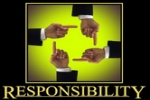Yesterday I was talking to a client who described a relationship between a manager and one of her team. As with all cases, there’s good and bad on both sides. Both have some poor communication habits. The manager, Angela, is 20 years younger than the employee and a bit inexperienced. She hasn’t really built rapport with her team and often relies on email, to communicate with them which is a bit impersonal. On the plus side, she’s a good worker and very diligent.
The employee, Barbara, has long service, is extremely competent, but is somewhat irascible. The organisation has just gone through a very trying year. Barbara had to support her boss who was extremely ill throughout this time, until he eventually left on a settlement agreement. Barbara herself has recently been diagnosed with a complaint that could be terminal.
The MD, John, has counselled Angela several times, but was dismayed when Angela announced that she is now logging everything Barbara says and is thinking of making a complaint because Barbara is rude and shows her no respect. Courtesy is the right of all employees. Respect is different. Angela will have to earn that and she clearly hasn’t.

While I expect both of them to take some responsibility for how they conduct themselves at work, I was particularly disappointed by Angela’s response. She’s the manager. She needs to start to manage. We can’t always be friendly with someone but we can agree a way of working. If it had been me I’d have sat down with a cup of tea and said “we haven’t got off the best start Barbara and now we’re getting on each other’s nerves. We need to unravel it a bit so we can work out how best to work together amicably. I’m open to all reasonable suggestions – how shall we approach this?” or words to that effect.
Here are my tips to encourage employees to take responsibility at work.
- When something goes wrong (and it will) get the employees who are responsible for the problem work out how best to resolve the problem.
- You should set workplace standards, but allow your team to decide how they will achieve them.
- Give the team a sense of ownership. If they experience all aspects of a service or product, they’ll understand more about it and be more interested in the process. People always work harder when they feel they have ownership of it.
- Decision-making shown be encouraged at the lowest possible level. To make sure that staff make the right decisions, they have to be trained to make decisions in a safe and sensible way.
- Encourage employees to take pride, both in their own job and in the company.
- Show employees how the job he or she does contributes to these outcomes.
- Reward those who meet or exceed their targets, and give guidance and correction to those who are not.
- When employees know that the role they play in the success of your business is important - and you recognise their contributions, it instils pride in the business.
You can’t force employees to take responsibility, but as employees gain skills and confidence, they will make more and more important decisions. If every role in your company is meaningful, employee responsibility will increase.
Russell HR Consulting provides expert knowledge in HR solutions, employment law training and HR tools and resources to businesses across the UK.
Subscribe to our free monthly HR newsletter. Russell HR Consulting employment law newsletters are emailed automatically to our ever-growing number of subscribers every month.
Latest blog posts
- Is There a Santa Clause?
06 / 12 / 2023
- Lend Us a Hand!
22 / 11 / 2023
- What Happens When There is a Clash in Protected Characteristics?
17 / 10 / 2023
- Encouraging a Healthy Workforce 2
21 / 09 / 2023
- Encouraging a Healthy Workforce
23 / 08 / 2023
- What a Disaster - (But We Have a Cunning Plan!)
20 / 07 / 2023
- It’s Time We Stiffened the Sinews
14 / 06 / 2023
- Why Is It So Important to Develop Emotional Resilience?
16 / 05 / 2023
- When is a discretionary bonus not discretionary?
20 / 04 / 2023
- Recovering Training Costs 15 / 03 / 2023
